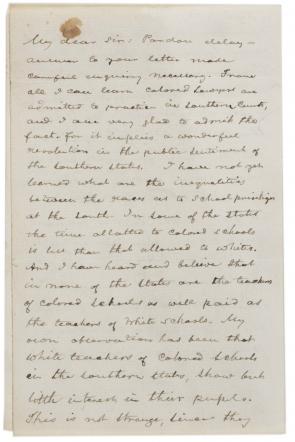Frederick Douglass on Jim Crow, 1887
A Spotlight on a Primary Source by Frederick Douglass
Frederick Douglass tirelessly labored to end slavery but true equality remained out of reach. Despite the successful passage of several Constitutional amendments and federal laws after the Civil War, unwritten rules and Jim Crow laws continued to curtail the rights and freedoms of African Americans. Douglass concisely summarized the reality of Jim Crow in an 1887 letter that claimed the South’s "wrongs are not much now written in laws which all may see – but the hidden practices of people who have not yet, abandoned the idea of Mastery and dominion over their fellow man." Racism, violence, and vigilantism were the tools of this "Mastery," which permitted whites to produce a social order characterized by inequality.
Having lived in Washington, DC, since 1872, Douglass had ample opportunity to witness discrimination in nearby Maryland and Virginia and was keenly aware of the struggle for quality schooling and judicial access during the post-Reconstruction years.Douglass’s writing reflected the belief shared amongst the black community that the best places to combat the "hidden practices" of Jim Crow were the schoolhouse and the court room. "[F]rom all I can learn colored lawyers are admitted to practice in Southern Courts and I am very glad to admit the fact – for it implies a wonderful revolution in the public sentiment of the Southern States. I have not yet learned what are the inequalities between the races as to school privileges at the south – In some of the states the time alloted to colored schools is less than that allowed to whites. And I have heard and believe that in none of the states are the teachers of colored Schools as well paid as the teachers of White Schools." By the 1880s, the separation of the races became increasingly apparent with school segregation mandated by law in nearly every Southern state. Despite this adversity, Douglass made it clear that inequalities could be corrected by challenging them.
Unfortunately, the situation became worse before it improved. Formal legal segregation in the South became a reality with the Plessy v. Ferguson ruling in 1896, which stated that segregation did not constitute discrimination, thus establishing the "separate but equal" doctrine. It would take nearly seventy years before the civil rights revolution that Douglass envisioned to take hold and provide for federally mandated equal conditions for all citizens.
A full transcript is available.
Transcript
My dear sir: Pardon delay - answer to your letter made careful enquiry necessary. From all I can learn colored Lawyers are admitted to practice in Southern Courts, and I am very glad to admit the fact - for it implies a wonderful revolution in the public sentiment of the Southern States. I have not yet learned what are the inequalities between the races as to school privileges at the South. In some of the states the time allotted to colored schools is less than that allowed to whites. And I have heard and believe that in none of the states are the teachers of colored Schools as well paid as the teachers of White schools. My own observation has been that white teachers of Colored Schools in the southern states, show but little interest in their pupils. This is not strange, since they have been selected as teachers more because of their necessities, than from any interests they have shown in the progress and elevation of the colored race. [struck: bu] I say this not of all, but of those in Virginia for instance who have come under my observation.
In Kentucky I believe so far as the law is concerned equal advantages are extended to colored children for Education, and the Same may be true of other states. I think the Bureau of Education will give you all the information you may require on this branch of the subject of your enquiries. Our wrongs are not so much now in written laws which all may see - but the hidden practices of a people who have not yet abandoned the idea of Mastery and dominion over their fellow man.
With great Respect
Yours truly
Fredk Douglass
Cedar Hill Anacostia D.C.
Nov: 23. 1887

